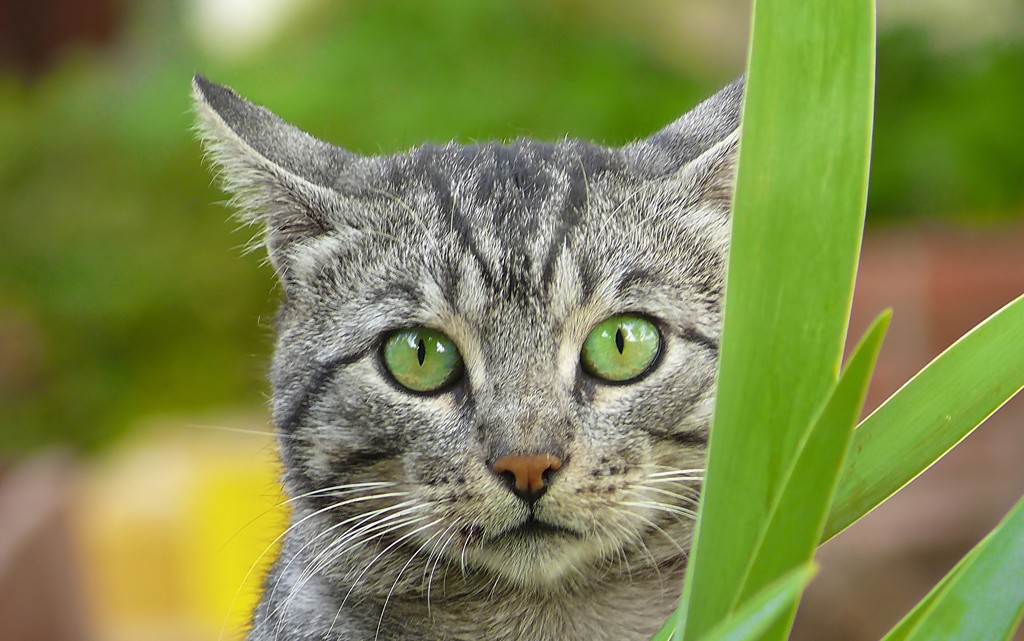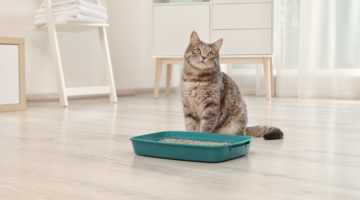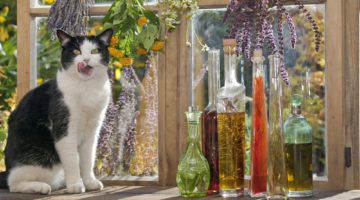Felines are especially responsive to this gentle healing modality. Find out which remedies can help your own furry companion.
You’ve probably heard the phrase “like cures like”. It’s one of the fundamental principles of homeopathy. The term is based on the Greek words meaning “similar suffering”. The concept is that a substance causing a symptom in a healthy person will treat that same symptom in a sick patient.
Homeopathic remedies are extremely dilute substances derived from the plant, mineral or animal kingdoms and used to treat many types of disease process. The remedies have been detailed by a process known as proving. People took the remedies over an extended period and made notes of their experiences. The master homeopaths then correlated all the information and determined that what causes these symptoms in a healthy person will treat those same symptoms in a sick person or animal.
For example, the remedy Urtica urens is made from the common nettle, which would cause intense itching in a healthy cat. Once it is diluted and made into a homeopathic remedy, however, it will treat itching in a cat with skin rash.
A single homeopathic remedy is chosen to treat the whole animal or person, including their mental, emotional and physical symptoms. This contrasts with conventional or allopathic medicine where symptoms tend to be suppressed or removed with medications or surgery. Of course there are certain life threatening situations where this is essential, but homeopathy can often provide a safe and natural alternative. Homeopathy actually stimulates the body to heal itself, strengthens the immune system, and leaves the body in a better state of health than before it became sick.
When determining the right remedy, the symptoms, behavior, mood, likes and dislikes of the cat are all taken into account.
It’s good for kitties
Homeopathy is non-invasive and gentle, and cats respond well to it. It can be used to treat a wide range of condi- tions. I have found it works very well for diarrhea, skin problems, kidney disease, liver problems and arthritis as well as more unusual conditions such as feline hyperesthesia syndrome. It can also help with behavioral problems such as aggression, fearfulness and anxiety.
Homeopathy is good to use in an emergency, even while you’re on the way to the veterinarian. It can help keep the cat stable while you’re waiting for medical assistance, and may even mitigate urgent situations.
What to expect
Homeopathic remedies can be purchased in a 30 C potency at a good health food store. They are given until the patient feels relief, and then as needed when symptoms return. One to three pellets is the usual dose for cats. They should be put directly into the mouth where possible and at least 30 minutes away from food.
In difficult cats, diluting the remedy in a bit of water also works.
Find a veterinary homeopath through the Academy of Veterinary Homeopathy (theavh.org) or the American Holistic Veterinary Medical Association (ahvma.org). Initially, nothing may appear to happen. The remedy will start to work but nothing may be apparent to begin with. In acute situations the effect is more rapid, and after a short time some improvement may be noted.
One important thing to look out for is an aggravation – this refers to a slight, temporary worsening of symptoms followed by improvement. This is a healing reaction, and a good sign that the correct remedy was chosen. In chronic disease, this aggravation may be seen after about three to five days, then gradual improvement should be noted. In acute disease situations where the onset was more rapid and severe, an aggravation might not necessarily occur or be noticed. However, after one or more doses of the appropriate remedy, you should see improvement.
More tips and suggestions
- Though homeopathy can help in an emergency, always seek veterinary assistance as soon as possible.
- For serious and chronic conditions, it is best to find a skilled veterinary homeopath to work directly with your cat. Homeopathy is a complex system of medicine that takes years of study.
- Remember that aggravations can occur but should be brief and transitory rather than a true worsening of the condition.
- Store remedies in a cool, dry place away from televisions, microwaves and strong odors, which may neutralize the remedy.
- Try not to directly touch the pellet if possible.
By learning more about this wonderful system of medicine (there are many courses available) and working with an experienced vet who is well-versed in this modality, you can give your cat a gentle and powerful way to heal.







No Comment